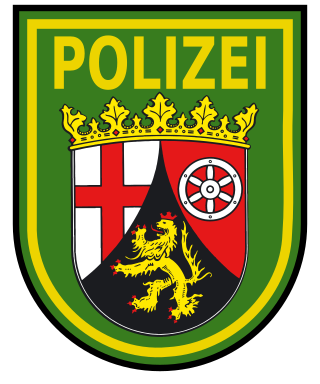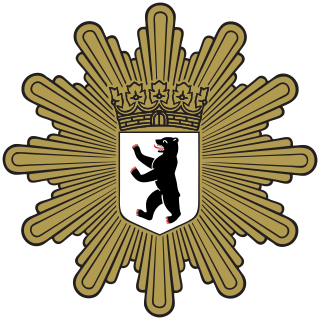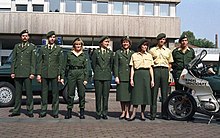GSG 9 der Bundespolizei, formerly Grenzschutzgruppe 9, is the police tactical unit of the German Federal Police (Bundespolizei). The unit is responsible for combatting terrorism and violent crime, including organized crime. In addition to its headquarters location in Sankt Augustin-Hangelar near Bonn, it also has a base in Berlin. Since 1 August 2017, it has been subordinate to the Federal Police Directorate 11. The state police (Landespolizei) maintain their own regional tactical units known as the Spezialeinsatzkommando (SEK).

Bundesgrenzschutz is the former name of the German Bundespolizei. Established on 16 March 1951 as a subordinate agency of the Federal Ministry of the Interior, the BGS originally was primarily focused on protecting the West German borders. During their early days, BGS units had military structures, training and equipment. The law enforcement officers legally had military combatant status until 1994. A major part of the early BGS personnel joined the newly founded German Armed Forces (Bundeswehr) in 1956 and thus significantly contributed to West Germany's rearmament. The BGS was renamed to Bundespolizei on 1 July 2005. The change of name did not have any effect on the legal status or competencies of the agency, but rather reflects its transition to a multi-faceted police agency with control over border, railway and air security.

Landespolizei is a term used to refer to the state police of any of the states of Germany.

Law enforcement in Germany is constitutionally vested solely with the states, which is one of the main features of the German political system.

The Rhineland-Palatinate State Police is the state police (Landespolizei) of the German federal state of Rhineland-Palatinate and numbers ca. 9,000 police officers. The headquarters of the five regional police authorities are in Koblenz, Trier, Mainz, Kaiserslautern and Ludwigshafen.

The Wasserschutzpolizei is the river police that patrols the waterways, lakes and harbours of Germany around the clock. The WSP are part of the Landespolizei. The Federal Police maintains 16 patrol craft and helicopters are part of the Coast Guard and assigned to coastal BPOL stations. The watercraft include six offshore patrol vessels, e.g. those of the Bad Bramstedt class, as well as a number of fast inshore vessels and one tugboat.

The Korps landelijke politiediensten was the national police force in the Netherlands from 1993 until January 2013, responsible for specialist missions that benefited from a centralized approach.
The Serbian Police, formally the Police of the Republic of Serbia, is the national civilian police force of the Serbia. The Serbian Police are responsible for all local and national law enforcement. It is under the jurisdiction of the Ministry of Internal Affairs.
Bahnpolizei is the term in Germany, Austria and the German-speaking parts of Switzerland for the Railway police.

In many countries, particularly those with a federal system of government, there may be several law enforcement agencies, police or police-like organizations, each serving different levels of government and enforcing different subsets of the applicable law.

The Federal Police is the national and principal law enforcement agency of Austria. The Federal Police was formed in July 2005 as one formal unit of police. In 2005, the Federal Police replaced the Austrian Federal Gendarmerie, which policed most of the country, and the Polizei which policed Austria’s major urban centres such as Vienna, Salzburg and Graz. The Federal Police also serves as Austria’s border control agency. The Federal Police works in partnership with the 19 municipal police agencies and other law enforcement agencies in Austria.
The German special forces include the Special Operations Forces of the German Army and the Naval Special Forces Command of the German Navy. Both are regular units and fully integrated into the branches of the German Armed Forces (Bundeswehr). During operations, special forces personnel are under the command of the special operations division of the Armed Forces Operations Command in Potsdam, a branch of the Joint Support Service (Streitkräftebasis).

Evidence and arrest units are special units of the German state police forces Landespolizei and the German Federal Police.

The Bad Bramstedt-class is a class of three offshore patrol vessels operated by the Federal Police of Germany. The vessels were ordered in year 2000 to replace the eight boats of the Neustadt class.

The Berlin Police is the Landespolizei force for the city-state of Berlin, Germany. Law enforcement in Germany is divided between federal and state (Land) agencies.

Polizeiliche Schutzaufgaben Ausland der Bundespolizei is a specialized unit of the German Federal Police tasked with providing personal security for German diplomatic missions in conflict regions.

Berlin is a city-state and the capital of the Federal Republic of Germany.

Bundespolizeidirektion 11 or BPOLD 11 is the unified command of the units with special tasks of the German Federal Police.











































